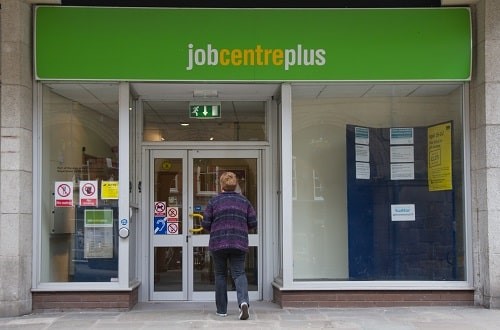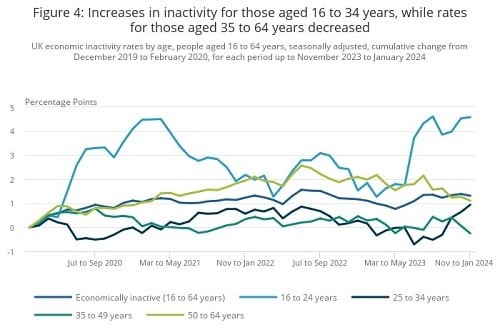The latest figures on economic inactivity in the UK have set off alarm bells about the future of the country’s workforce, with young people aged between 16 and 34 driving a rise in the number of people who are not working or actively seeking employment.
News
ONS figures on UK economic inactivity prompt concerns over health of younger workers
More than a fifth (21.8 per cent) of adults aged 16-64 in the UK were not in employment or looking for work between November 2023 and January 2024, figures released on 12 March by the Office for National Statistics (ONS) have revealed. This is an increase of 0.1 percentage points on both the previous quarter and the same three-month period a year ago.
The increase in economic inactivity was driven by those aged 16 to 34 years, said the ONS, while the number of economically inactive people aged between 35 and 64 fell during the period. The rise in the number of younger people out of work and not seeking employment has prompted concerns from labour groups about the health of both the UK’s workers and its economy.
 Photograph: iStock/peplow
Photograph: iStock/peplow
“This is being driven by more young people and older people outside the labour force, and in particular because of more people reporting long-term health conditions that stop them from working,” said Tony Wilson, director of the Institute for Employment Studies, in response to the ONS figures.
“In our view, this is holding back the recovery as the economy is continuing to create jobs, with nearly a million unfilled vacancies reported today. This reiterates that we need a different approach to how we reach and engage with people who are out of work and may want to come back to work. In particular, our employment services need to be more accessible, inclusive and supportive.”
Wilson also urged employers to “play their part” and “do more to keep people in work and to open up opportunities for those who may need more support”.
The number of people who were economically inactive because of long-term sickness fell in the latest quarter, said the ONS, but remained higher than estimates a year ago.
The Resolution Foundation said in response to the figures that “unlike other rich countries, UK employment is still below pre-pandemic levels, thanks to near-record long-term sickness”. The think tank’s senior economist, Louise Murphy, said: “After a four-year rollercoaster, the labour market is starting to return to normal, with both unemployment and job vacancies back around pre-pandemic levels.
“But one lasting change is that our workforce is sicker. We have gone from chasing record levels of employment to tackling record levels of long-term sickness. Getting more people from inactivity into employment is Britain’s biggest labour market challenge of the 2020s.”
 Source: Labour Force Survey from the Office for National Statistics
Source: Labour Force Survey from the Office for National Statistics
Murphy’s comments followed the publication last month by the Resolution Foundation of research showing that the number of young people out of work due to ill-health has more than doubled over the past decade, from 93,000 to 190,000. As a result, said the think tank, “people in their early 20s are now more likely to be economically inactive due to ill-health than those in their 40s”.
The National Centre for Universities and Business (NCUB) has described the UK’s economic inactivity rate as “worryingly high” and is calling for a comprehensive government strategy to address workforce preparation and training.
“Without assistance, our nation’s young people will continue to face unemployment and employers will lose out on the innovative, talented workforce they crucially need to recover,” said NCUB chief executive Dr Joe Marshall. “We are calling on the Government to introduce a cohesive plan that involves all stakeholders: the education and training sector, as well as businesses.
“Without such a strategy, we risk exacerbating the challenges of skill gaps and unemployment, hindering our nation’s economic growth and resilience.”
NEWS

Employers urged to listen to staff when designing workplace wellbeing strategies
By Kerry Reals on 26 April 2024
Conversation is king when it comes to implementing effective workplace wellbeing strategies, a panel of experts told a recent conference organised and hosted by British Safety Council.

Climate change could expose 70 per cent of workers to health risks, warns UN
By Kerry Reals on 22 April 2024
More than 70 per cent of the global workforce could be exposed to serious health hazards because of climate change, and existing occupational health and safety legislation may not be sufficient to protect workers, according to a new report by the International Labour Organization (ILO).

Calls for wellbeing focus intensify as UK economic inactivity rate rises further
By Kerry Reals on 16 April 2024
The number of working-age people in the UK who are neither employed nor looking for a job rose again in the December to February period, prompting calls for more investment in training and a greater focus on the health and wellbeing of the nation.



